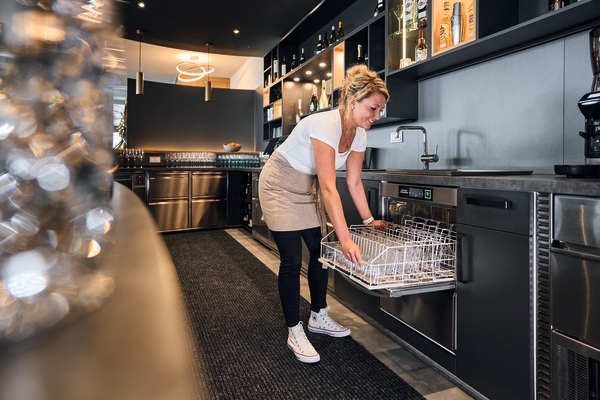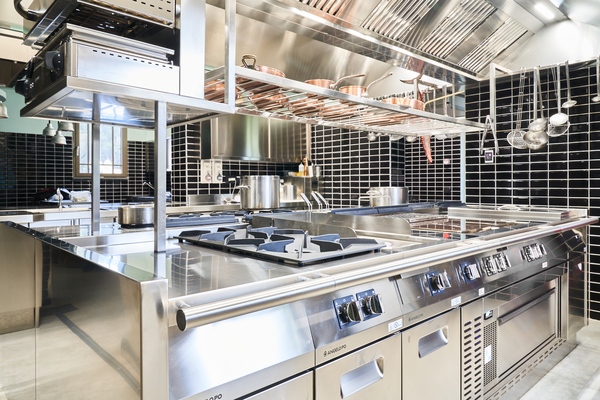Hotel kitchens oftentimes operate around the clock. Behind the scenes, a carefully curated selection of advanced equipment ensures that even if there are too many cooks in the kitchen, they can prepare dishes with consistency, speed and quality.
Over the past decade, technological advancements and a push for sustainability have transformed the way hotel kitchen’s function. The evolution of electric cooking equipment, integration of digital monitoring systems and a focus on energy consumption have all played a significant role in shaping modern operations. Meanwhile, new innovations, such as multifunction blast chillers, smart dishwashing systems and precision induction cooktops, are becoming essential tools in the industry. Even the often-overlooked dishwashing area has seen significant improvements, with smart technology streamlining hygiene and efficiency.

THE ESSENTIALS
Two of the most significant pieces of equipment in a hotel kitchen are the combi oven and the cooking range, according to Chiara Fedozzi, kitchen design solutions manager at equipment manufacturer Angelo Po. The combi oven is indispensable for preparing breakfast items like pastries, croissants and bread, and it pairs well with a blast chiller for food preservation, Fedozzi said.
The cooking range, meanwhile, is critical for lunch and dinner service, offering chefs the flexibility to prepare soups, sauces and main courses, efficiently. Together, these tools ensure a hotel kitchen can cater to a broad menu while maintaining high-quality standards.
Verena Rist, marketing manager international at warewashing specialist Winterhalter, highlights a less glamorous but equally crucial element: the dishwasher. “Even if you first think of cooking appliances, we will say the dishwasher. If the dishwasher fails, chaos quickly ensues,” she said. A well-functioning dishwashing system ensures a steady supply of clean plates, cutlery and cookware, keeping service uninterrupted and hygienic.
AN EVOLUTION
Hotel kitchens have undergone major transformations over the past decade. One of the most notable shifts is the move toward electric equipment, particularly induction cooktops.
“There has been a significant shift toward the adoption of electric kitchen equipment, particularly induction cooktops, which offer greater efficiency and precision,” said Fedozzi. Additionally, kitchens are now focusing on optimizing energy consumption and minimizing food waste by incorporating advanced appliances like multifunction blast chillers. These compact yet powerful units enable cook-and-chill processes that enhance workflow efficiency while reducing resource waste.
Rist pointed out that sculleries have also changed dramatically. “The scullery itself has become much smaller,” she said. “There is often not enough space for a basin for pre-rinsing. This makes it even more important that the dishwashing organization is perfectly planned and organized.”

ROLE OF TECHNOLOGY
Technology has become an indispensable component of modern hotel kitchens. One of the most groundbreaking innovations is digital connectivity, particularly in dishwashing systems. Rist highlighted Winterhalter’s Connected Wash, a system that allows kitchen staff to monitor dishwashers remotely. “All important machine data of the networked dishwasher can be analyzed, evaluated and accessed from anywhere. Automatic updates ensure that the machine’s software is always up to date and that new functions are immediately available,” she said.
For cooking appliances, Fedozzi pointed to multifunction blast chillers like the ARI.O. “These advanced units allow kitchens to optimize downtime, making use of hours when staff are not on duty. For example, low-temperature vacuum cooking can be programmed to run overnight,” she said. This technology ensures that dishes like custards, roasts and seafood salads are prepared with minimal labor while maintaining food safety and quality.
SUSTAINABILITY
Sustainability is no longer just a buzzword; it’s a priority in the hospitality industry. Hotel kitchens are now integrating eco-friendly materials and energy-efficient models to reduce their environmental footprint. “Our kitchens are certified with the Hygienic Design label by CSQA, ensuring that less detergent is required for cleaning, reducing both chemical use and water waste,” said Fedozzi.
Dishwashing systems are also embracing sustainability. Connected Wash, for instance, ensures that machines operate at peak efficiency, minimizing water and detergent consumption. “Thanks to remote services, settings can also be adjusted. This saves time and service costs, as ideally, on-site service is no longer necessary,” Rist explained.

PREVENTATIVE MAINTENANCE
No matter how advanced the equipment, maintenance is key to keeping hotel kitchens running smoothly. “One of the main challenges in maintaining hotel kitchen equipment is ensuring proper scheduled maintenance,” said Fedozzi. She suggested conducting preventive maintenance during low-season periods to avoid unexpected breakdowns.
Winterhalter tackles this issue with maintenance contracts, ensuring regular check-ups and reducing the chances of machine failure. “We offer different maintenance contracts. This means that our machine is regularly checked and maintained. Failures are reduced,” said Rist.
LOOKING AHEAD
The future of hotel kitchen equipment is geared towards smarter, more sustainable and more efficient solutions. As digitalization continues to integrate into kitchen operations, remote diagnostics, automated cooking processes and energy-efficient models will become the standard.
Ultimately, the goal remains the same: to create seamless kitchen operations that support chefs in delivering high-quality, timely and sustainable meals to guests. With continuous advancements in kitchen technology, hotel kitchens are set to become even more efficient, eco-friendly and adaptable to the ever-evolving needs of the hospitality industry.
